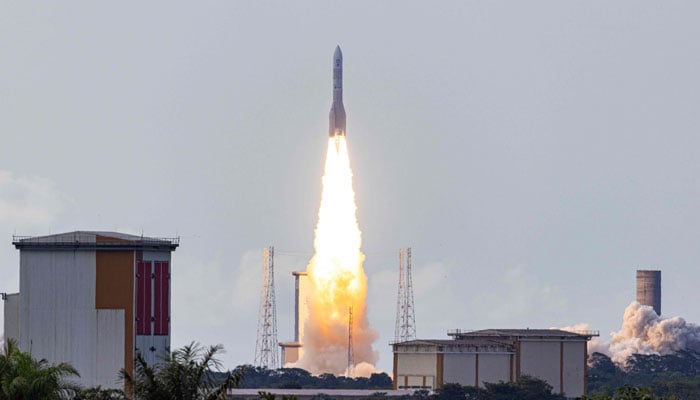Europe's Ariane 6 blasts off into space on maiden launch
European space officials declare Ariane 6 maiden trip a success despite encountering a glitch
Europe's Ariane 6 successfully launched into space for the first time on Tuesday after encountering a data glitch moments before taking off from Kourou, French Guiana at 4pm local time.
According to Reuters, the launch, which marks the continent's resurgence in space exploration, encountered a setback when the rocket failed to release its final batch of payloads.
However, European space officials declared the maiden trip a success after the rocket, which was observed by a Rafale fighter jet during its launch, deployed three sets of micro-satellites for research, affirming the mission's success despite being non-commercial.
The launch was initially supposed to be carried out in 2020 but delays, political setbacks and debates over funding hindered it for nearly four years.
"Europe is back in space," Philippe Baptiste, head of France's CNES space agency, said via video link to the Paris headquarters of the European Space Agency (ESA), where employees and politicians cheered the lift-off.
The Vinci engine, designed to restart repeatedly, was restarted in space for the first time, allowing Arianespace to place payloads into various orbits.
However, a third firing was abandoned due to a smaller power unit shutting down, leaving the final batch of payloads — two small capsules designed to test the conditions for surviving re-entry — stuck onboard.
"We had an anomaly...We are probably not going to finish this part of the mission as we were hoping to," said Tina Buchner da Costa, an Ariane 6 launch system architect.
The affected auxiliary power unit is a system crucial for the rocket's ability to put payloads in their intended orbit.
Its failure, although late in the mission, is expected to spur an engineering investigation.
ESA Director General Josef Aschbacher said the agency was nonetheless on track to stage a second flight by year-end.
Ariane 6 was developed at an estimated cost of 4 billion euros by ArianeGroup, co-owned by Airbus and Safran. Its first launch, originally due in 2020, has been repeatedly delayed.
Since the agency retired its workhorse Ariane 5 rocket more than a year ago, Europe has had no independent means of sending its satellites into space, while war in Ukraine has cut Western ties to Russian Soyuz rockets and Italy's Vega C is grounded.
-
Dutch seismologist hints at 'surprise’ quake in coming days
-
SpaceX cleared for NASA Crew-12 launch after Falcon 9 review
-
Is dark matter real? New theory proposes it could be gravity behaving strangely
-
Shanghai Fusion ‘Artificial Sun’ achieves groundbreaking results with plasma control record
-
Polar vortex ‘exceptional’ disruption: Rare shift signals extreme February winter
-
Netherlands repatriates 3500-year-old Egyptian sculpture looted during Arab Spring
-
Archaeologists recreate 3,500-year-old Egyptian perfumes for modern museums
-
Smartphones in orbit? NASA’s Crew-12 and Artemis II missions to use latest mobile tech












